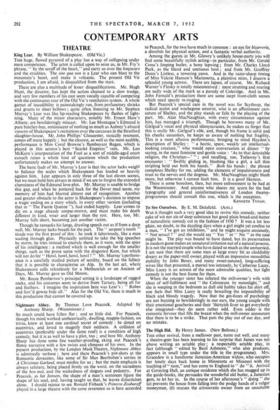So much could have fallen flat ; and so little
did. For Peacock, though his mind worked untheatrically, dwelling, magpie-fashion, on trivia, knew at least one cardinal secret of comedy : he doted on eccentrics, and loved to magnify their oddness. A collision of eccentrics (preferably under the same roof) is a condition of high comedy, but it is as well to have a plot, too ; and here Mr. Anthony Sharp has done some fine weather-proofing, eking out Peacock's flimsy narrative with a few twists and climaxes of his own. In the present production, by the London Mask Theatre, Nightmare Abbey is admittedly verbose ; here and there Peacock's pot-shots at the Romantic dovecotes, like some of Sir Max Beerbohm's sorties in A Christmas Garland, must misfire for us ; but the main emphasis is always salutary, being placed firmly on the word, on the sacredness of the bon mot, and the wickedness of slogans and pedantry. For Peacock, as for Jonson, the shape of a man's sentences figure the shape of his soul, and, having taught us that, he leaves didacticism alone. I should rejoice to see Ronald Firbank's Princess Zoubaroff played in a large theatre with the same reverence as is here accorded to Peacock, for the two have much in common : an eye for bizarrerie, a disrclish for physical action, and a fantastic verbal authority.
Among the guests at Mr. Glowry's unlikely house-party you will find some beautifully stylish acting—in particular, from Mr. Gerald Cross's limping butler, a bony lapwing ; from Mr. Charles Lloyd Pack, as the bland and unctuous host ; and from Mr. Geoffrey Dunn's Listless, a towering yawn. And in the razor-sharp timing of Miss Valerie Hanson's Marionetta, a plaintive minx, I discern a splendid young actress. There are lapses, of course. Mr. Richard Warner's Flosky is totally misconceived : mere strutting and roaring are sadly wide of the mark as a parody of Coleridge. And in Mr. John Fernald's production there are some inept front-cloth scenes which need speedy re-staging.
But Peacock's special care in the novel was for Scythrop, the radical zealot and woebegone amorist, who is an affectionate cari- cature of Shelley, and the play stands or falls by the playing of the part. Mr. Alan MacNaughtan, with every circumstance against him, has managed a triumph. Though he borrows many of Mr. Gielgud's vocal and physical idiosyncrasies, he makes us forget that this is really Mr. Gielgud's role, and, though his frame is solid and his cheeks unsunken, he keeps us aware of nothing but fragility. This is a most allusive performance, bringing to mind Haydon's description of Shelley : " a hectic, spare, weakly yet intellectual- looking creature," who would open conversation at dinner " by saying, in the most feminine and gentle voice : 'As to that detestable religion, the Christian—' " ; and recalling, too, Trelawny's first encounter : " Swiftly gliding in, blushing like a girl, a tall thin stripling held out both his hands." Both his hands : the phrase completes Shelley for me, adding the elements of impulsiveness and trust to the nerves and the dogmas. Mr. MacNaughtan might blush more, but otherwise I cannot fault him. It is a good likeness.
There is some boredom, then, but more enlivenment to be had at the Westminster. And anyone .who shares my scorn for the bad typography and general uninformativeness of London theatre- programmes should consult this one, which is the exception.
KENNETH TYNAN.


































 Previous page
Previous page